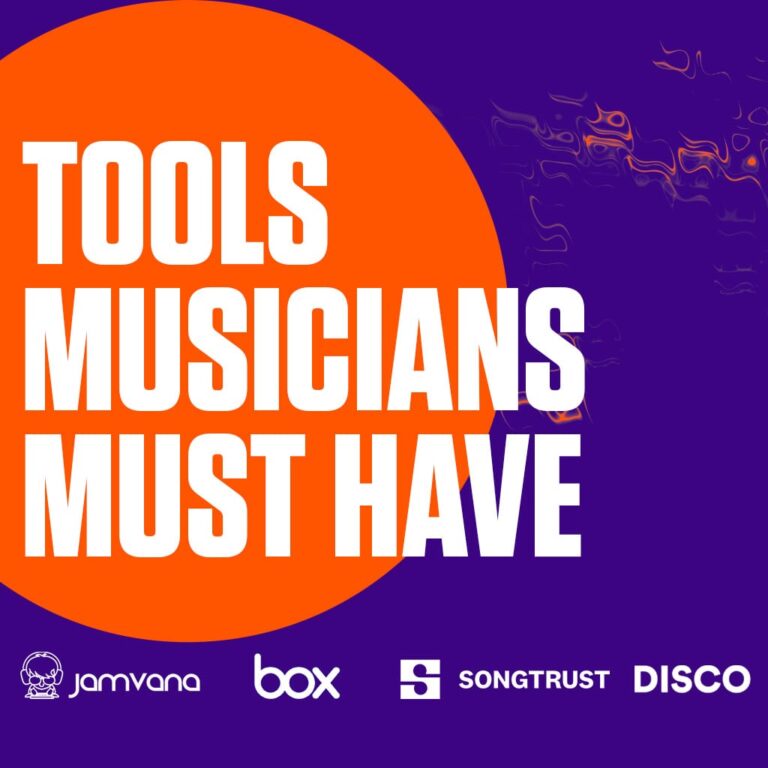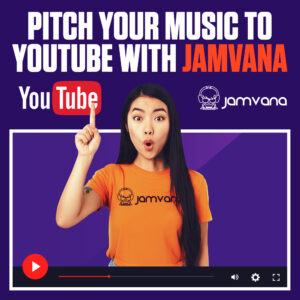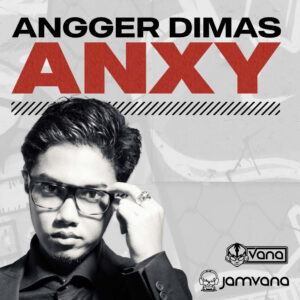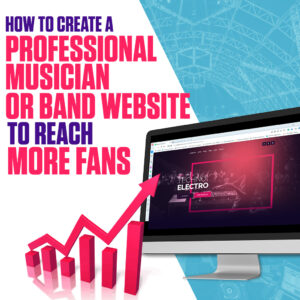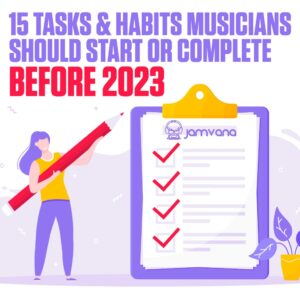Are you a musician looking to get organized? Do you need online storage and backup solutions? Are you in the market for an easy-to-use online tool to create cover art, tour posters, and social media graphics?
Musicians have consistently had to take on their own careers and manage them all by themselves, but with the the increasing amount of tools available to content creators online, stressing over organization, project management, and online storage backups are becoming a thing of the past.
All of these tools are built to make our lives easier. Some of the tools even allow you to automate entire workflows, saving you hours of time and a lot of money.
So, musicians, let’s dig into the best tools to for your arsenal in 2023.
Note: The information presented in this article, such as pricing and package offerings, is subject to change at any time and may differ than what’s posted in this article. We will do our best to keep the information here updated, but if you’re interested in using one of the products, check their website for their most updated packages and pricing.
Here are the 31 best tools for musicians to grow their careers in 2023 and beyond.
- DISCO
- Box
- Jamvana
- Google Drive for Docs, Sheets, Slides, and Forms
- Professional email address
- Digital audio workstation
- DocuSign
- Songtrust
- Camera
- Gumroad
- Squarespace
- MasterClass
- Splice
- Linktree
- Hunter.io
- Clubhouse
- GigSalad
- Bandcamp
- MusicTheory.net
- Backblaze
- Zapier
- Chartmetric
- Sound Credit
- Mp3tag
- Canva
- Spotify for Artists
- SubmitHub
- Calendly
- MusicPro Insurance
- ConvertKit
- Asana
- Conclusion
DISCO
Sharing audio files on Dropbox, Google Drive, and SoundCloud is not as ideal anymore. DISCO has quickly become a gold standard for sharing audio files with others, especially music supervisors. They almost always use DISCO to organize their libraries of music.
DISCO allows users to create playlists, upload stems, provide contact information, lyrics, publishing information, IPI numbers, and more directly in their upload, thus removing the need for multiple documents for each track.
DISCO’s “Lite” plan allows for one user and 500 tracks for $10/mo. “Plus” starts at $15/mo. and increases track limit to 1,000. Their “Pro” plan starts at $25/mo. and includes everything in the Plus plan as well as custom fields, password protection, and distributor ingestion.
Box
Box is an online cloud storage platform that’s similar to Dropbox and Google Drive. They are one of the best cloud storage services on the market and are headquartered in Redwood City, California.
Keeping all of your files in one centralized location makes it easier for you and your team to access them whenever, wherever. With Box, users can upload most file types, add comments for collaborating on documents, and backing up your files.
Box offers an Individual, Personal Pro, Business Starter, and Business Plans. The individual plan is free for a single user, allows for a 250MB file upload limit, and 10GB of storage. Their Personal Pro plan is $14/user/mo. and provides up to 100GB of storage and a 5GB file upload. Their Business Plans range in price from $20/user/mo. to $47/user/mo. and allow for more users and unlimited storage, which may be more ideal if you’re looking to use it as a backup solution.
Jamvana
Jamvana is a premiere music distribution platform that gives musicians the tools to distribute and monetize their music onto leading service providers like Spotify, Apple Music, Amazon Music, and more. They are headquartered in Orlando, Florida.
Getting your music onto digital distribution services is one thing, but getting it in front of the right audience is much more difficult. Jamvana’s custom-built content management system has tools built in to curate your audience, get playlisted, and get heard. Jamvana actively pitches music to DSPs and their playlist editors and work diligently to ensure your release goes as smoothly as possible.
In addition, Jamvana has the most transparent and detailed royalty reports of any other music distributor. With their standard subscription, you’ll get online backup solutions for your audio files and documents, music distribution, marketing tools, playlist pitching, and much more.
Jamvana offers a free plan and a subscription plan for $9.99/mo. and you’ll keep 100% of your royalties. Get started here.
Google Drive for Docs, Sheets, Slides, and Forms
Similar to Box, Google Drive is a great solution for backing up, storing files, and working collaboratively with others.
The most attractive feature of having a free Google account are their office suite programs, such as Sheets, Docs, Slides, and Forms, among others. They’re continuously adding new features to each program. Docs and Sheets are great programs to utilize when writing lyrics, writing press releases, and keeping a rolodex of industry contacts.
Their Google One plan provides multiple tiers that include 15GB for free, $1.99/mo. for 100GB, $2.99/mo. for 200GB, and $9.99/mo. for 2TB of storage.
Professional email address
The music industry is all about networking, so you’ll be sending and receiving a lot of emails. It’s important that you look professional online, and a branded email can help with that.
A branded email is an email that utilizes your artist, band, or business name. For example, instead of mybandrocks@gmail.com, you could have jane.smith@mybandrocks.com.
There are a number of ways to go about creating this, but the easiest is to use Google Workspace. It’s easy to set up and will allow you to keep the aforementioned Docs, Sheets, Slides, and Forms under the same account. A Google Workspace account can be created for as little as $6/mo.
Explore the other methods of setting up a business email address.
Digital audio workstation
A digital audio workstation (or DAW) is a computer application that provides musicians and producers to write, record, mix, and master their music.
No digital audio workstation is better than the other, per se, but they each will have different features that may make it easier for you to get ideas out when those moments arise. Just because one producer uses Ableton doesn’t mean that it’s going to work for you. Research which DAW has the features you’re looking for and explore those options extensively.
Here is a list of the most popular DAWs in 2022, according to MusicRadar:
- Cubase
- Studio One
- Bitwig
- Ableton
- FL Studio
- Logic Pro X
- Reaper
- Reason
- Pro Tools
- GarageBand
- Mixcraft
- Cakewalk by BandLab
DocuSign
DocuSign is an e-signature company headquartered in San Francisco, California. With DocuSign, users can upload documents and send them to the parties who need to sign.
Before working with anybody on music (including your best friend) it’s important to have agreements written and signed by everybody contributing to the work. These agreements typically include who owns how much of the publishing and the master, admin privileges, how royalties are split up, and more.
You can use a program like Google Docs to draft up a basic agreement and then use DocuSign to have the other parties digitally sign it. This acts as a legal-binding document.
DocuSign offers a free 30-day trial to get you started. Their Personal plan is $15/user/mo., Standard is $45/user/mo., and Business Pro is $65/user/mo. You can also choose to pay annually and save $120, $300, or $480, respectively.
Alternatives to DocuSign: HelloSign, Adobe Sign
Songtrust
Songtrust is a music publishing administration company. They provide tools that allow artists and songwriters to collect their music publishing royalties. They are headquartered in New York and owned by Downtown Music Holdings.
Songtrust will collect your publishing royalties from around the globe while you maintain 100% ownership of your music. Should you land a sync deal, you’ll retain 100% of the sync fees. They have contracts with more than 215 collection societies around the world.
When your song is played on radio in France, Songtrust will collect those royalties. If it’s aired on a TV show in Switzerland, they’ll collect those royalties.
It’s worth noting that Songtrust is not a publisher.
Songtrust costs a flat one-time fee of $100 to get set up. They’ll then keep 15% of the royalties they collect.
Unless you want to manually strike deals with collection societies for your publishing royalties across Europe, Africa, or Asia, then Songtrust is well worth the $100 fee and 15% of the royalties.
Camera
It’s very important to be able to put out high quality photos and videos. You most likely already own a high end camera: your phone.
Any mobile device made within the last 3-5 years is likely capable of shooting HD photos and videos. They can be used to create social media content and even film music videos.
The music video for Lady Gaga’s “Stupid Love” was shot entirely on an iPhone Pro 11. Watch the official music video below.
Gumroad
Gumroad is an online e-commerce platform that allows content creators, including musicians, to sell digital products. They were founded in 2011 and are headquartered in San Francisco, California.
In the digital world, people want and will pay for just about anything if they can have instant access to it and it’s helpful. This also gives fans of artists’ work another avenue to support them.
To give you some ideas, you could sell sheet music, the WAV file to your latest single, a project file, top 10 lists, a subscription to a mini series, and much more. Think of your talents and how you could package them up into a digital asset that you could sell. If successful, selling digital goods on Gumroad may provide you with a really strong source of revenue alongside your streaming income.
Gumroad is free to get started, and as you sell more they will take less in fees.
Squarespace
Squarespace is a website building and hosting company headquartered in New York. Their online website builder is easy to use, set up, and affordable. Features include e-commerce integrations with platforms like Shopify, appointment scheduling, and free templates.
Websites for musicians help with their visibility in the digital realm. They act as a digital resume where fans and industry professionals can go to find and read everything about you. Some pages that should be on an artist’s website include a biography, high resolution press pictures, social media links, and music.
Squarespace offers four different plans: Personal ($23/mo.), Business ($33/mo.), Basic Commerce ($36/mo.), and Advanced Commerce ($65/mo.).
Their personal plan is probably sufficient enough for artists just getting started; however, the inclusion of the professional email, as we discussed above, from Google is a nice perk in their Business plan.
MasterClass
MasterClass is an online learning platform that hosts courses from musicians like Hans Zimmer, Danny Elfman, deadmau5, Alicia Keys, and more. Their courses span a wide gamut of cooking, film making, sports, music, and more so it’s not just for music.
Continuing education is vital to remaining with the times. The music industry evolves at an alarming rate, and new techniques and programs are always being introduced. MasterClass is a solid solution for independent music professionals to remain at the top of their game.
Starting at $15/mo., one user can sign up for MasterClass’s Individual plan. Their Duo plan offers one account for two devices for $20/mo. Finally, they have a Family plan for one account and six devices for $23/mo. The difference between the plans is the Individual one does not offer downloading for offline viewing.
Alternatives to MasterClass: LinkedIn Learning, SkillShare, Coursera
Splice
Splice is a cloud-based music creation and collaboration platform. They offer industry-leading sample libraries, audio plug-ins, and integrations with most digital audio workstations, including Ableton, Logic Pro X, and FL Studio.
Losing your projects is a nightmare and worst-case scenario for every musician and producer. Artists can save and automatically backup their projects with every digital audio workstation to Splice for free. Their paid subscriptions grant access into the sample libraries, plug-ins, exclusive online events, and more. Even if you’re not interested in using their sample libraries, saving them to the cloud and having unlimited storage is a no-brainer.
Splice offers three plans: Sounds+ for $14.99/mo., Creator for $19.99/mo., and Creator+ for $39.99/mo.
Linktree
Linktree is a free “link in bio” tool and landing page for content creators. They are headquartered in Melbourne and Sydney, Australia.
The way that Linktree works is that creators get one link that they can use in social media bios, emails, SMS marketing, and more. This Linktree link will take people who click on it to a landing page “tree” that links to other places, such as a merch store, Spotify profile, place to buy tickets for a tour, a recent podcast interview, and more. You can link to where you’d like.
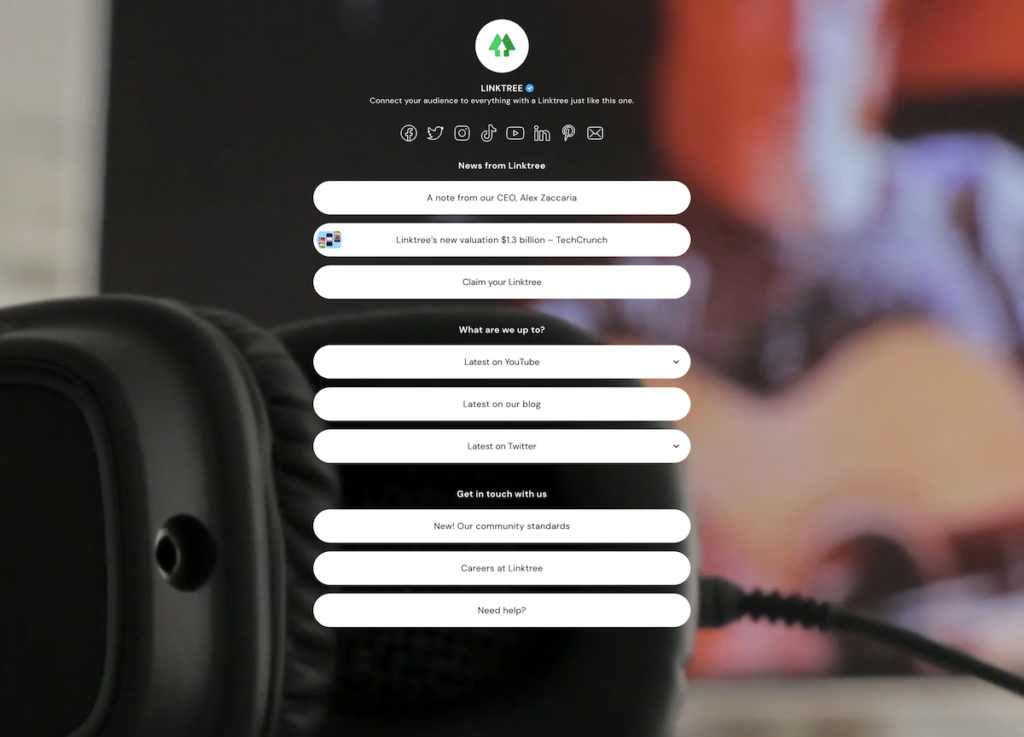
Linktree has a few tiers, including a free tier. Their Starter plan is $5/mo., Pro is $9/mo., and Premium is $24/mo. All plans include unlimited links, a QR code, music links, Spotify embeds, and social icons.
Alternatives to Linktree: SmartURL, Koji, Tap Bio, Linkin.bio, Taplink
Hunter.io
Hunter.io is a program used to find and verify email addresses. Their program scrapes the internet for contact information for people at various organizations. Personally, I’ve used this application in the past and have found it to be very useful.
Trying to contact someone at a record label or publishing company can be difficult unless you already know someone who has previously connected with them. As mentioned above, you’ll most likely be reaching out to these people quite frequently. Unless someone is very public facing, it can be difficult to get in touch with them and Hunter can help find and verify that email address.
Hunter uses a number of techniques to find and verify emails, such as scouring the internet and skimming, for example, an article a person may have done where their email is published.
While incredibly helpful and valuable, their pricing can get expensive if you’re on a budget. They do have a free plan that allows for 25 monthly searches and 50 monthly verifications. After that their Starter plan is $49/mo., Growth is $99/mo., Pro is $199/mo., and Business is $399/mo.
Alternatives to Hunter.io: RocketReach, ZoomInfo, Apollo.io, and UpLead
Clubhouse
Clubhouse is a social audio platform that rose to prominence in 2020 at the start of the pandemic. They used to be invite-only, but it is now open to everyone on iOS and Android. They are headquartered in San Francisco, California and developed by Alpha Exploration Co.
Clubhouse is a great place to connect with other music professionals, perform live in rooms, and join in on conversations to showcase your expertise. A number of high profile experts across varying sectors of music are always joining in on rooms sharing their knowledge. It’s a best practice to find and follow the people you want to learn from so you are notified when they speak in a room.
Clubhouse is free to join and use.
Alternatives to Clubhouse: Twitter Spaces, Facebook Live Audio Rooms, Reddit Talk, Spotify Greenroom
GigSalad
GigSalad is a full-service platform for booking gigs. Musicians and creatives alike can join the platform and start getting booked for events in their area. They are headquartered in Springfield, Missouri.
Musicians looking to get their name out there could use GigSalad to expand their horizons and begin performing at events like weddings, concerts, birthday parties, and much more. If you live in a music hub like Los Angeles or Nashville, for example, you never know who’s going to be at a birthday party you’re hired for. That could be your next big break!
GigSalad offers a few tiers for those looking to get their name out and start getting events booked. They offer a free plan, but they claim it provides the fewest leads and there’s a 5% booking fee. Their Pro plan is $139/3 mos., and Featured is $169/3mos. and they claim it garners an average of 26x more leads than the Free plan.
Alternatives to GigSalad: The Bash, StarNow, Backstage, Jammcard
Bandcamp
Acquired by Epic Games in 2022, Bandcamp is an online music streaming service that gives musicians an alternative to selling their music. Fans can purchase high quality music directly from their favorite artists. They are headquartered in Oakland, California.
Bandcamp is a great tool for musicians because of its ease of use and ability for fans to easily connect and support the music they love. Similar to distributing music through a distributor like Jamvana, they give musicians the flexibility they need to release music when and how they want. They can also set a minimum price for how much they’d like to receive for their album.
Bandcamp is free to use, but they will take a commission on every sale. They’ll charge 15% for digital items and when you reach $5,000 in sales, that rate drops to 10%. Bandcamp also charges a 10% fee for physical items as well as shipping and tax and their payment processor fees between 4-6%.
Bandcamp is not a distributor. In order to get your music on Spotify, Apple Music, Amazon Music, etc, you’ll need to use a music distribution service like Jamvana.
MusicTheory.net
MusicTheory.net is a free resource for everything related to music theory. You can practice scales, do ear training, and even take short lessons to freshen up on those pesky Neapolitan chords.
Staying fresh on music theory and learning new techniques will only better you as a musician, and MusicTheory.net is an impeccable resource for that. Their exercises are great if you find yourself with 15-minutes of downtime, like at the airport or the in-laws’ Thanksgiving get together.
Backblaze
Backblaze is an online cloud storage and data backup company that is headquartered in San Mateo, California.
Backblaze operates slightly differently than Dropbox, Google Drive, or Box does. It’s great for those with hard drives filled with samples, project files, and audio files. Download the free Backblaze application, plug in your hard drive, and it’ll begin uploading all of the files to Backblaze’s servers. You’ll get unlimited storage, files, and file size.
Backblaze will save up to 30 days worth of backups and then begin overwriting them with the most current ones after that. If your hard drive crashes, you can download the files for free from the web or have it shipped to you on a flash drive for $99 or an external drive for $189. You’ll receive a full refund upon the return of the flash drive or hard drive.
Their personal plan is only $7/mo. This plan should be sufficient for most musicians backing up one or a few hard drives.
Zapier
Zapier is an online tool with thousands of integrations between web applications, allowing users to automate almost everything. They are based in Sunnyvale, California.
There are endless use cases for musicians and Zapier. One example would be everytime someone purchases a song on Bandcamp, add their contact information to a Google Sheet. Then when that Google Sheet is updated, Zapier can be triggered to send a notification in your team Slack. The chain of automations and possibilities are unlimited.
They do have a free tier, but it’s limited in features. Their other plans are:
- Starter: $29.99/mo.
- Professional: $73.50/mo.
- Team: $598.50/mo.
- Company: $1,198.50/mo.
The free plan should be enough to get your feet wet, and the Starter plan would be a great next step, especially if you’re going to need more automation.
Chartmetric
Chartmetric is an online service that provides musicians with comprehensive streaming and social media data so they can succeed in their careers.
The program operates by connecting streaming services and social media platforms and compiling the data into an easy-to-use and digestible dashboard. With this data, artists are able to obtain a 360-degree view of their career. They’ll be able to see how their music is performing on Spotify, Apple Music, TikTok, and many other places.
This information will inspire additional marketing and growth opportunities and allow artists to make “money moves.”
Chartmetric is used by record label A&Rs, music supervisors, artists, digital marketers, and brand partnerships.
Chartmetric’s “Artist Plan” costs $10/mo. ($100/yr.) and gives subscribers full access up to three subscribed artists, 28 days of historical database, basic data access on millions of artists, and more. Their “Premium” plan, however, is the most robust. It costs $140/mo. ($1,399/yr.) and features the full historical database, audience demographic insights, A&R dashboard, and more.
Check out the hour-long video below to see how Chartmetric works and how you can use it to track your music on digital service providers.
Sound Credit
Sound Credit is a one-stop shop for your entire music and its metadata. They’ve essentially converted those detailed and confusing spreadsheets into an easy-to-use software. They also provide you with an ISNI, which is a vital piece of your metadata.
Sound Credit relaunched their pricing tiers with “Starter,” “Pro,” and “Business” packages, which start at $10/mo., $39/mo., and $99/mo., respectively. Each tier will give subscribers additional features, such as more storage, additional exports for metadata for mastering, lyric sheets, and more. With their “Pro” tier, subscribers will have access to the “Vault,” Sound Credit’s online storage solution.
Subscribers of Sound Credit can also use their program to share their profile using their Creator ID and collaborate with other musicians. This ensures all participants receive proper credit (and royalties).
Sound Credit provides an excellent suite of tools to keep all of your audio files and metadata in one easy to access location.
Mp3tag
Mp3tag is a desktop application for Windows and Mac that is used to edit the metadata of audio files. The application allows content creators to edit MP3, MP4, M4V, FLAC, OGG, OPUS, AIF, DSF, MPC, WV, and WAV files.
In addition, Mp3tag supports online database lookups from Discogs and MusicBrainz. Integration with these online music databases allows Mp3tag to properly tag and download cover art for users with large libraries of music.
Music metadata is one of the most important things that creatives forget about when releasing their music to the world. Without the proper, or incorrect, metadata, digital streaming platforms don’t know who to pay royalties to.
Canva
Think of Canva like an online version of Adobe’s Photoshop. It’s powerful, easy-to-use, and affordable. Canva is used by creatives in every sector of business, including music. The platform is used to create business sales reports, presentations, resumes, handbooks, social media graphics, and much more.
This handy little online tool can be used to create cover art, tour posters, social media graphics, and pitch decks for musicians.
Canva’s pricing is affordable and easy to understand. They offer a free version, which features their drag-and-drop editor, 250,000+ free templates, 1+ million free photos and graphics, and 5GB of cloud storage. Their “Canva Pro” plan is $12.99/month for one person. With this plan, subscribers can enjoy unlimited features, folders, and premium content; 610,000+ premium and free templates with new designs being added daily; and 100+ million premium stock photos, videos, audio and graphics.
If you’re looking for an alternative to Photoshop, then Canva is an excellent (and affordable) solution for creatives at all levels.
Spotify for Artists
Spotify for Artists is a musician’s goldmine for analytics on Spotify. This backend tool allows artists and their teams to develop their fanbases and discover who their fans are and where they’re located, among many other things.
Within your Spotify for Artists dashboard you’ll be able to see exactly where your music is being played, what playlists its featured in, and pitch to Spotify’s editorial playlists.
You’ll also be able to customize your Spotify profile directly within the Spotify for Artists app. It’s free to join, and we recommend all artists and musicians join it so they can see exactly how their music is performing on Spotify.
SubmitHub
SubmitHub is a tool that’s used by musicians to pitch their music to Spotify playlist owners, social media influencers, record labels, blogs, and more. It was founded in late-2015 by Jason Grishkoff.
For the most part, SubmitHub is free to use; however, some online publications, influencers, and playlist owners require a small fee to pitch to them. This covers the time it takes to thoroughly review and listen to your music. If you’re looking to pitch your music, SubmitHub is one of the most efficient and effective ways to do it.
SubmitHub currently works with Universal Music Group, Sony Music, Warner Music Group, Ultra Music, Ninja Tune, and more.
Calendly
Calendly is the easiest and one of the best scheduling applications available. It’s easy to setup and frees up time for creatives so they don’t have to focus so heavily on the administrative tasks of booking meetings.
Calendly’s ability to automate the booking process removes the busywork for creatives. You can set your availability in the backend, connect it with your calendar, and setup specific meeting types. When you add a new event to your calendar, Calendly will update in realtime to ensure an event doesn’t get booked over that time.
If you’re a musician and are constantly doing studio sessions, or even consulting of any kind, then Calendly is a must-have in your arsenal.
Calendly does offer a free plan, but it’s limited in features and has the “Powered by Calendly” branding on everything. If you want to remove Calendly’s branding, you’ll need to upgrade to their Essentials ($10/seat/mo.), Professional ($15/seat/mo.), or their Teams plan ($20/seat/mo).
MusicPro Insurance
MusicPro Insurance is an insurance company that is tailored towards music professionals. The insurance company is co-owned by ASCAP and SterlingRisk. They launched in 2000 and have become a primary choice for insurance when it comes to protecting musicians’ musical instruments and equipment.
Insurance is crucial if you’re a musician who’s on the road a lot, or has amassed a large collection of hardware over the years, then insuring your livelihood is crucial.
Pricing for insurance varies on location, amount of gear you have, and how much it’s valued at. To get an accurate quote, check out their free coverage quote tool.
ConvertKit
ConvertKit is a creator marketing platform for musicians, authors, podcasters, and business owners. Their software allows musicians to build an audience quicker than any other email marketing platform out there. ConvertKit also makes it easy to create campaigns to send to fans and subscribers of your list.
Creatives shouldn’t spend hours designing and crafting email campaigns to send to fans and followers. It should remain simple and just work. That’s where ConvertKit thrives because it’s built for today’s content creators.
ConvertKit’s plans vary depending on how many subscribers your email list contains, like many other email marketing platforms out there. Plans range from $15/mo. for up to 300 subscribers on their “Creator” plan and go up to $2,599/mo. for up to 400,000 subscribers on their “Creator Pro” plan. If you need more, you’ll need to schedule a demo with the ConvertKit team.
Alternatives to ConvertKit: Mailchimp, ActiveCampaign, Constant Contact
Asana
Asana is a robust project and team management platform. It’s used by companies in all sectors of business to organize, track, and manage their work. They are headquartered in San Francisco, California and launched commercially in 2012.
Managing huge, time-sensitive projects via email or notes just is not a solution anymore. Having one cohesive and organized dashboard for every project and where it’s at in the pipeline is crucial for efficiency and productivity.
For musicians specifically, Asana’s functionality would allow you to layout (and template for future uses) a single/EP/album release rollout. You can invite your band, team, and/or label to your dashboard so everyone can begin working on their assigned tasks. You’ll never forget to register a copyright, submit music to distribution, or miscommunicate with your graphic designer on tour graphics or album art again.
Asana offers a free tier, which is perfect for individuals and small teams who are just getting started with project management. If you find yourself needing additional features that Asana offers, you’ll need to upgrade to their “Premium” or “Business” plans, which cost $10.99/user/mo. and $24.99/user/mo., respectively.
Conclusion
There are new tools that can increase productivity popping up every single day and it can become difficult to sift through the herd of which ones are usable, how they function, and if they’re worth the price they’re charging. From automating your life with Zapier to selling your music on Bandcamp, all of these tools can fill in a blank in your career.
The products and services listed in this post are some of the most beneficial for artists and musicians.
Are there any products or services we missed? Share them in the comments because we’re always looking for the best products to improve productivity.
